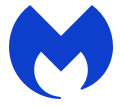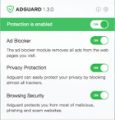What is ArchivesTransation
ArchivesTransation is an adware application that targets Mac computers. Adware is form of malware that can cause problems for your computer. It can generate numerous additional popup, banner, pop-under and in-text link advertisements flooding on your web browser; collect your confidential information such as login details, online searches, etc; run in the background and drag down your computer running speed; give more chances for other adware, PUPs even malware to get on your MAC.
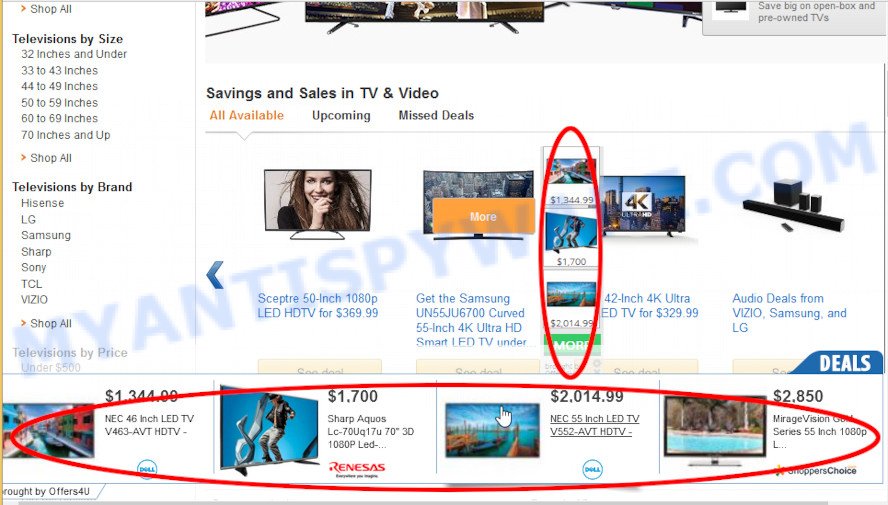
Unwanted ads
Even worse, the ArchivesTransation app can analyze the location and which Web webpages you visit, and then present ads to the types of content, goods or services featured there. Its creators can collect and sell your surfing information and behavior to third parties. We recommend you to complete guide below to delete the adware software and remove annoying advertisements from your web-browser.
How does ArchivesTransation get on your MAC OS
The most common way to get adware is a freeware setup file. In many cases, a user have a chance to disable all included ‘offers’, but certain install packages are designed to confuse the average users, in order to trick them into installing PUPs and adware. Anyway, easier to prevent adware software rather than clean up your MAC after one. So, keep your browser updated (turn on automatic updates), use good antivirus software, double check freeware before you launch it (do a google search, scan a downloaded file with VirusTotal), avoid shady and unknown webpages.
Threat Summary
| Name | ArchivesTransation |
| Type | adware, potentially unwanted application (PUA), Mac malware, Mac virus |
| Detection Names | Adware.MAC.Generic, Osx.Adware.Cimpli, Trojan-Downloader.OSX.Adload, OSX.Trojan.Gen, Program:MacOS/Vigram.A, Adware/Adload!OSX, MacOS.Agent-MT and ApplicUnwnt |
| Distribution | Freeware installers, torrent downloads, dubious pop up ads and fake software updaters |
| Symptoms | You keep getting redirected to suspicious websites, web browser popups appear and recommend fake security software, there is an unexpected program in the ‘Applications’ section of the Finder, unwanted web-browser toolbars, your Apple Mac settings are being changed without your request, your web-browser slows to a crawl. |
| Removal | ArchivesTransation removal guide |
How to Remove ArchivesTransation adware (removal guide)
The answer is right here on this web-page. We have put together simplicity and efficiency. It will help you easily to clean your MAC of ArchivesTransation adware. Moreover, you can choose manual or automatic removal way. If you’re familiar with the machine then use manual removal, otherwise run the free anti malware tool created specifically to remove adware software. Of course, you can combine both methods. Some of the steps below will require you to close this web site. So, please read the steps carefully, after that bookmark it or open it on your smartphone for later reference.
To remove ArchivesTransation, perform the steps below:
- Remove profiles created by ArchivesTransation
- Remove ArchivesTransation associated software by using the Finder
- Remove ArchivesTransation related files and folders
- Scan your Mac with MalwareBytes
- Remove ArchivesTransation from Safari, Chrome, Firefox
- How to stay safe online
Remove profiles created by ArchivesTransation
ArchivesTransation can make changes to the Mac system such as malicious changes to browser settings, and the addition of malicious system profiles. You need to check the system preferences, find and remove malicious profiles and ensure your settings are as you expect.
Click the System Preferences icon ( ![]() ) in the Dock, or choose Apple menu (
) in the Dock, or choose Apple menu ( ![]() ) > System Preferences.
) > System Preferences.
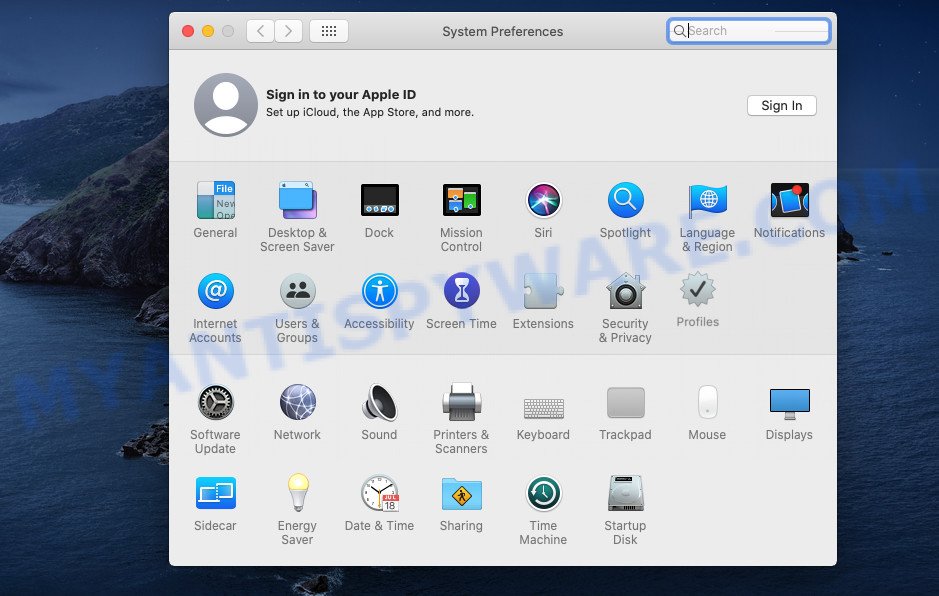
In System Preferences, click Profiles, then select a profile associated with ArchivesTransation.
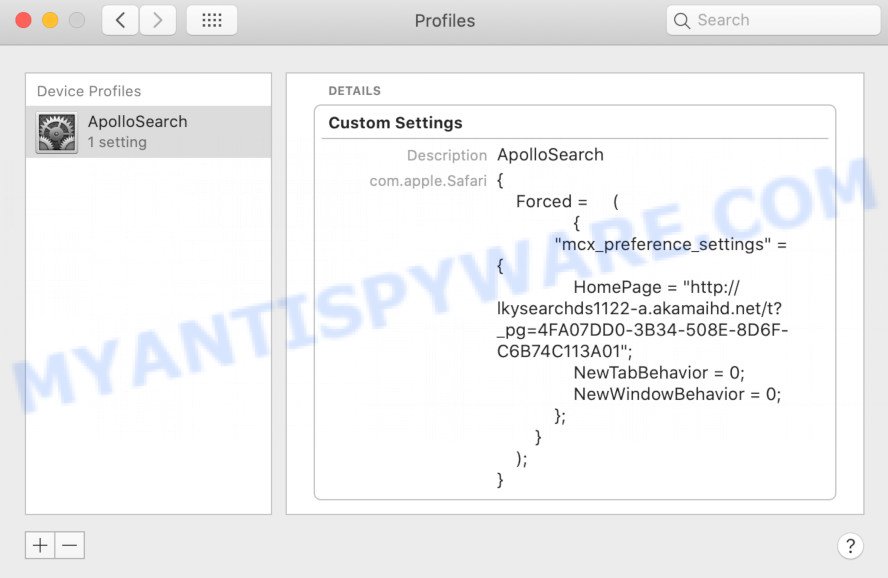
Click the minus button ( – ) located at the bottom-left of the Profiles screen to remove the profile.
Note: if you do not see Profiles in the System Preferences, that means there are no profiles installed on your Mac device, which is normal.
Remove ArchivesTransation associated software by using the Finder
Check the list of installed software on your Mac device and delete all unknown and recently installed programs. If you see an unknown program with incorrect spelling or varying capital letters, it have most likely been installed by malware and you should clean it off first with malware removal tool such as MalwareBytes Free.
Open Finder and click “Applications”.
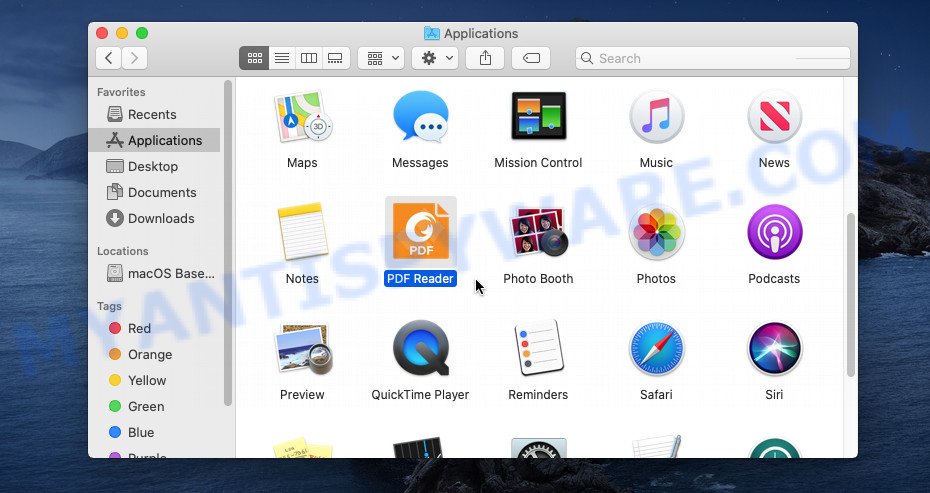
It will display a list of all programs installed on your computer. Scroll through the all list, and remove any dubious and unknown applications. Right click to suspicious program and select “Move to Trash”. Another way is drag the application from the Applications folder to the Trash.
Most important, scroll through the all list, and move to trash any unknown applications. Don’t forget, choose Finder -> Empty Trash.
Remove ArchivesTransation related files and folders
Now you need to try to find ArchivesTransation related files and folders, and then delete them manually. You need to look for these files in certain directories. To quickly open them, we recommend using the “Go to Folder…” command.
ArchivesTransation creates several files, these files must be found and removed. Below is a list of files associated with this unwanted program.
- /Library/LaunchDaemons/com.ArchivesTransation.system.plist
- ~/Library/LaunchAgents/com.ArchivesTransation.service.plist
- /Library/Application Support/.(RANDOM)/System/com.ArchivesTransation.system
- ~/Library/Application Support/.(RANDOM)/Services/com.ArchivesTransation.service.app
Some files created by ArchivesTransation are hidden from the user. To find and delete them, you need to enable “show hidden files”. To do this, use the shortcut CMD + SHIFT + . Press once to show hidden files and again to hide them. There is another way. Click Finder -> Applications -> Utilities -> Terminal. In Terminal, paste the following text: defaults write com.apple.finder AppleShowAllFiles YES

Press Enter. Hold the ‘Option/alt’ key, then right click on the Finder icon in the dock and click Relaunch.
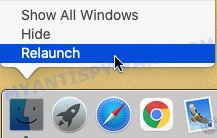
Click on the Finder icon. From the menu bar, select Go and click “Go to Folder…”. As a result, a small window opens that allows you to quickly open a specific directory.

Check for ArchivesTransation generated files in the /Library/LaunchAgents folder

In the “Go to Folder…” window, type the following text and press Go:
/Library/LaunchAgents
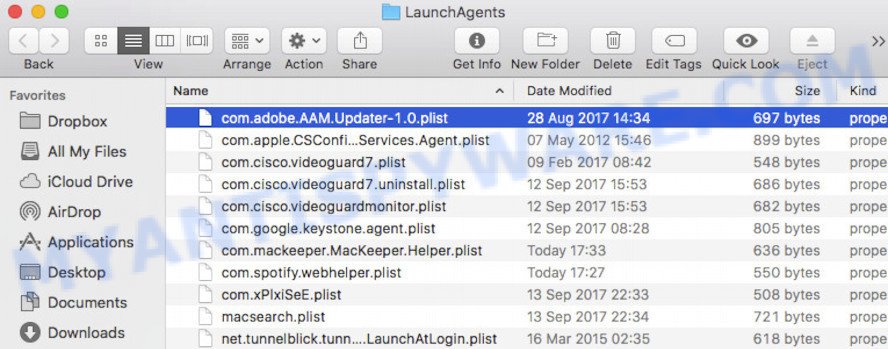
This will open the contents of the “/Library/LaunchAgents” folder. Look carefully at it and pay special attention to recently created files, as well as files that have a suspicious name. Move all suspicious files to the Trash. A few examples of files: com.google.defaultsearch.plist, , com.ArchivesTransation.service.plist, search.plist, com.net-preferences.plist, com.machelper.plist, installapp.plist and macsearch.plist. Most often, browser hijackers, adware and PUPs create several files with similar names.
Check for ArchivesTransation generated files in the /Library/Application Support folder

In the “Go to Folder…” window, type the following text and press Go:
/Library/Application Support
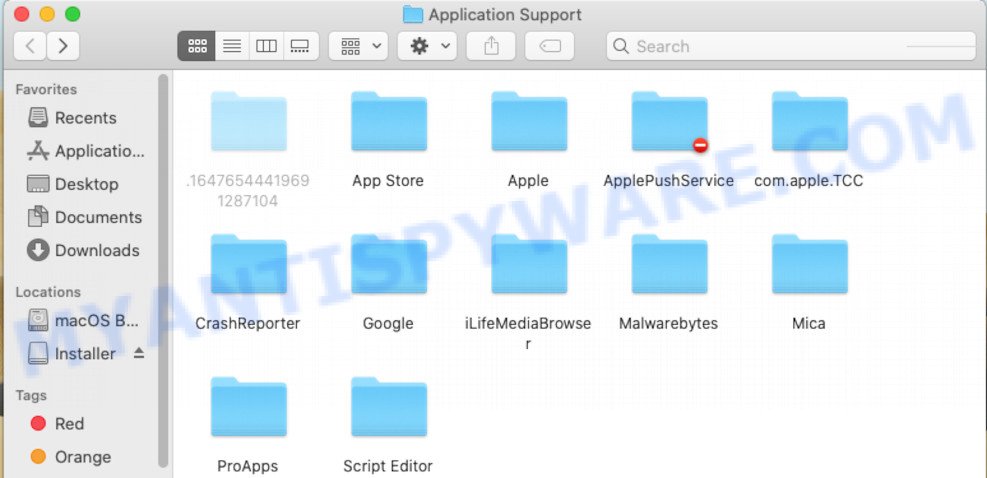
This will open the contents of the “Application Support” folder. Look carefully at its contents, pay special attention to recently added/changed folders and files. Check the contents of suspicious folders, if there is a file with a name similar to com.ArchivesTransation.system, then this folder must be deleted. Move all suspicious folders and files to the Trash.
Check for ArchivesTransation generated files in the “~/Library/LaunchAgents” folder

In the “Go to Folder…” window, type the following text and press Go:
~/Library/LaunchAgents

Proceed in the same way as with the “/Library/LaunchAgents” and “/Library/Application Support” folders. Look for suspicious and recently added files. Move all suspicious files to the Trash.
Check for ArchivesTransation generated files in the /Library/LaunchDaemons folder
In the “Go to Folder…” window, type the following text and press Go:
/Library/LaunchDaemons

Carefully browse the entire list of files and pay special attention to recently created files, as well as files that have a suspicious name. Move all suspicious files to the Trash. A few examples of files to be deleted: com.search.system.plist, com.macsearch.system.plist, com.ArchivesTransation.system.plist, com.machelper.system.plist and com.installapp.system.plist. In most cases, PUPs, adware and browser hijackers create several files with similar names.
Scan your Mac with MalwareBytes
Manual ArchivesTransation removal requires some computer skills. Some files and system entries that created by the adware can be not completely removed. We suggest that use MalwareBytes Free to scan the Mac computer. Moreover, this application will allow you to delete toolbars, adware, browser hijackers and potentially unwanted programs that your MAC may be affected too.
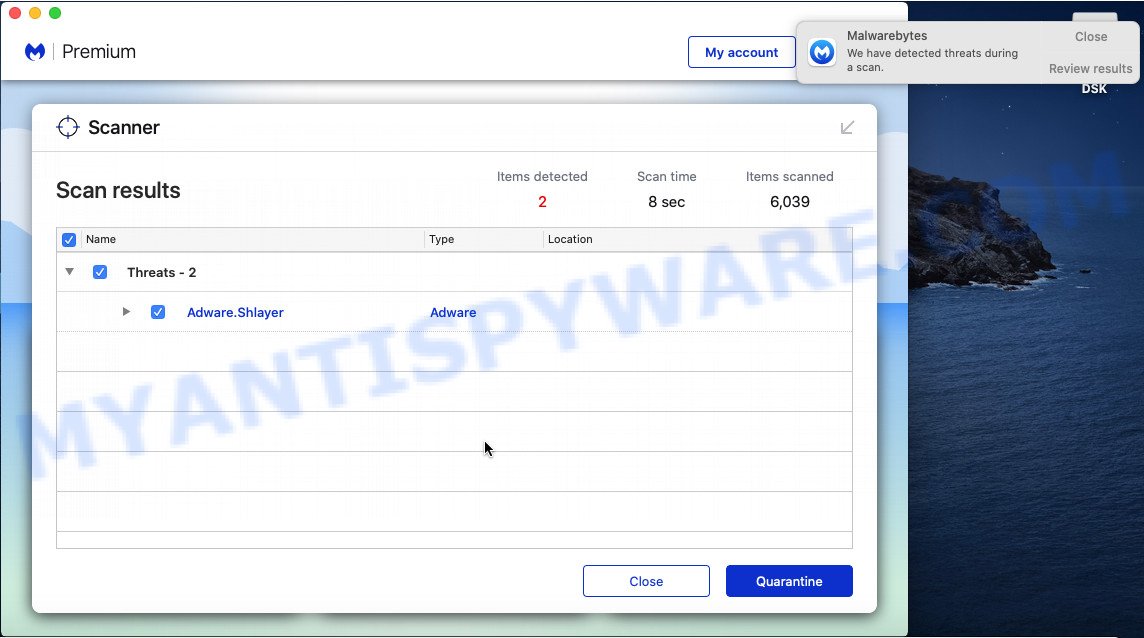
- Visit the page linked below to download the latest version of MalwareBytes for Apple Mac.
Malwarebytes Anti-malware (Mac)
20945 downloads
Author: Malwarebytes
Category: Security tools
Update: September 10, 2020
- When downloading is done, please close all apps and open windows on your machine. Run the downloaded file. Follow the prompts.
- The MalwareBytes Free will launch and show the main window.
- Further, press the “Scan” button to perform a system scan with this tool for the ArchivesTransation adware. A scan may take anywhere from 10 to 30 minutes, depending on the number of files on your MAC and the speed of your computer. While the MalwareBytes utility is checking, you may see how many objects it has identified as being affected by malicious software.
- Once the scan is complete, MalwareBytes AntiMalware (MBAM) will display a list of found threats.
- Review the scan results and then click the “Remove Selected Items” button.
- Close the AntiMalware and continue with the next step.
Remove ArchivesTransation from Safari, Chrome, Firefox
If you have ‘ArchivesTransation ‘ removal problem, then remove unwanted extensions can help you. In the steps below we’ll show you the method to remove harmful extensions without reinstall. This will also help to get rid of ArchivesTransation adware software from your browser.
You can also try to remove ArchivesTransation adware by reset Google Chrome settings. |
If you are still experiencing problems with ArchivesTransation removal, you need to reset Firefox browser. |
|
How to stay safe online
Running an ad-blocking application like AdGuard is an effective way to alleviate the risks. Additionally, ad blocker applications will also protect you from harmful advertisements and web-pages, and, of course, stop redirection chain to misleading, scam and similar web sites.
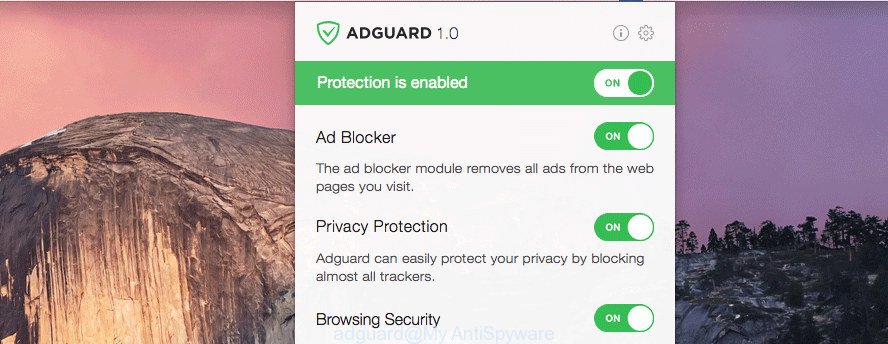
- Download AdGuard on your computer by clicking on the link below.
AdGuard for Mac download
3753 downloads
Author: © Adguard
Category: Security tools
Update: January 17, 2018
- When downloading is done, run the downloaded file. You will see the “Setup Wizard” program window. Follow the prompts.
- When the install is complete, click “Skip” to close the setup program and use the default settings, or click “Get Started” to see an quick tutorial which will help you get to know AdGuard better.
- In most cases, the default settings are enough and you don’t need to change anything. Each time, when you run your computer, AdGuard will start automatically and stop unwanted advertisements, block malicious and misleading web-sites.
To sum up
Once you have finished the few simple steps above, your MAC OS should be clean from this adware and other malware. The Safari, Mozilla Firefox and Chrome will no longer open intrusive ArchivesTransation web site when you browse the World Wide Web. Unfortunately, if the step-by-step instructions does not help you, then you have caught a new adware, and then the best way – ask for help.
Please create a new question by using the “Ask Question” button in the Questions and Answers. Try to give us some details about your problems, so we can try to help you more accurately. Wait for one of our trained “Security Team” or Site Administrator to provide you with knowledgeable assistance tailored to your problem with the unwanted ArchivesTransation adware software.
